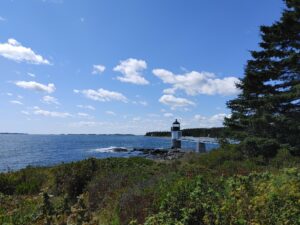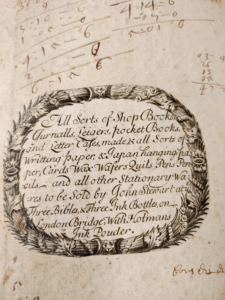I’m delighted to host a Guest Post by Lucretia Grindle, author of The Devil’s Glove today.
It’s always lovely to hear what inspired an author to tell a story.
Two Objects of Inspiration.
At its heart, The Devil’s Glove is a story about clashing worlds. The Native world and the Anglo-European world. The private world of The Hammonds and the social world beyond that judges them. The Old World of England, Jersey, and London and the New World of New England, Massachusetts, and The Eastward.
The nature of these places that form the lives of the central characters – the wild coast of Maine, where they must carve out a future, and the cosmopolitan world of England, and especially London, that not only contains their past, but is also the center of the trade they depend on – were central to how I thought about, and wrote, The Devil’s Glove. I was fascinated by how different they were, while at the same time being so deeply inter-linked. The two photos included here sat on my desk as I worked on the story, and were a constant source of inspiration.

I took this photograph on one of the many trips I made up and down the coast while I was working on the book. ‘Place’ has always been a central element, basically a character, in my writing. In The Devil’s Glove in particular, the coast of Maine is more than just a ‘setting’. It physically and emotionally forms what happens to and around the characters in the book. Obviously, the ocean dictates how they must live their lives. It terrifies, nurtures, protects and threatens them – and is also the primary route in and out of the Falmouth settlement. They can be saved, or attacked by water.
But that is only half of the coast. The other half is the forest that still covers so much of Maine today. To the Native tribes in particular, it is a sanctuary. To many of the villagers, it is an ominous presence – a dark and forbidding place that houses people and things that terrify them. Warriors burst without warning out of its depths. Captives disappear into it and are never seen again. Strange noises come from it. This is the wilderness their civilization must battle against.
Not so for Resolve and Deliverance Hammond. Nothing typifies their difference from the villagers in Falmouth quite as much as their attitude to, and relationship with, both the water and the forest. Resolve swims, and feels herself transforming, and connecting with another world. When she goes into the woods, she feels it close around her, cradling her – literally. This is ‘The Greening’ where she spent her childhood, the sanctuary that kept her and her mother safe.
For The Hammond women, crossing the cove is entering another world. Water takes them there, while the forest itself, once a classroom when they were sheltered by Ashawonks, is increasingly a source of power, and a portal – an entry point not only into the past, but also into the parallel Native world. One that could not be more removed, and yet is strangely linked to the second photograph I kept on my desk.

I found this scrap in a junk shop in London. The fact that it is dated from the same year The Devil’s Glove is set in made it a perfect juxtaposition to the still wild Maine coast. This lovely little piece of printing, with odd scraps of addition doodled around it, lists a sale of all sorts of things, including bibles and ink pots, letters cases cards and pens that are for sale in a shop on London Bridge.
Most of the things it lists have to do with literacy and writing which were central to the world of the late 17th century – and seem very far removed from the great forests of The Eastward, as Maine was known at the time. But were they? Yes, these are the emblems and tools of European ‘civilization’, but they are also the emblems, and tools, of trade.
‘Civilization’ as the Anglo-European immigrants who peopled 17th century New England conceived of it, was the anti-thesis of – and the thing that had to be imposed on – the vast, frightening wilderness they found themselves in. Yet, the raw goods of trade; furs, lumber, fish, came from that wilderness. Pens, letters cases, pocket books recorded and tracked that trade, which would also become the engine that powered and enabled that same ‘civilization’ to cross and re-cross the Atlantic, getting first a foothold, and then a grip on Maine’s rock-bound coast. And, eventually, even in her dense all-encompassing forests.
As I wrote The Devil’s Glove, I found these two photos represented the difference between the worlds the Hammond women inhabited, and their interdependence. Look at them one way, and they are completely opposed. Look at them again, and they are completely interlinked. The coast of Maine in 1688 is the future, while the Old World of London is the past. Or, those pens and pots of ink, those bibles are the wave of the future, set to crash into a Native past cradled by Maine’s forest and her sea.
Thank you Lucretia, for this fascinating post!
 Northern New England, summer, 1688.
Northern New England, summer, 1688.
Salem started here.
A suspicious death. A rumour of war. Whispers of witchcraft.
Perched on the brink of disaster, Resolve Hammond and her mother, Deliverance, struggle to survive in their isolated coastal village. They’re known as healers taught by the local tribes – and suspected of witchcraft by the local villagers.
Their precarious existence becomes even more chaotic when summoned to tend to a poisoned woman. As they uncover a web of dark secrets, rumors of war engulf the village, forcing the Hammonds to choose between loyalty to their native friends or the increasingly terrified settler community.
As Resolve is plagued by strange dreams, she questions everything she thought she knew – about her family, her closest friend, and even herself. If the truth comes to light, the repercussions will be felt far beyond the confines of this small settlement.
Based on meticulous research and inspired by the true story of the fear and suspicion that led to the Salem Witchcraft Trials, THE DEVIL’S GLOVE is a tale of betrayal, loyalty, and the power of secrets. Will Resolve be able to uncover the truth before the town tears itself apart, or will she become the next victim of the village’s dark and mysterious past?
Praise for The Devil’s Glove:
“From its opening lines this historical novel from Grindle (Villa Triste) grips with its rare blend of a powerfully evoked past, resonant characters, smart suspense, and prose touched with shivery poetry.” ~ BookLife Reviews Editor’s Pick
Buy the BookThis title is available to read on #KindleUnlimited.
Find Lucretia on her Website: http://LucretiaGrindle.com or Amazon Author Page: https://www.amazon.com/author/lucretiagrindle


Thank you so much for hosting Lucretia Grindle with such a fascinating guest post.
Cathie xx
The Coffee Pot Book Club